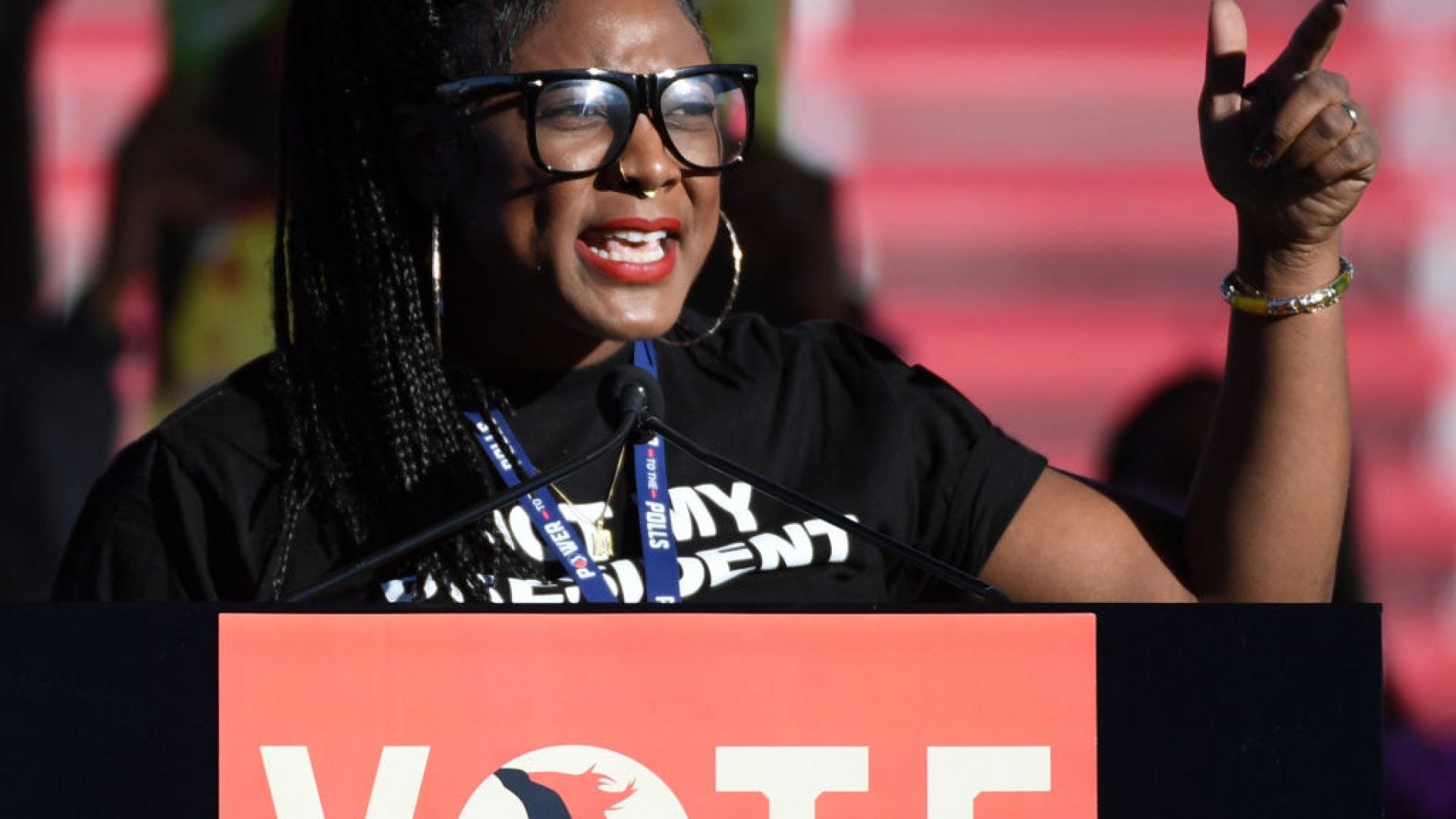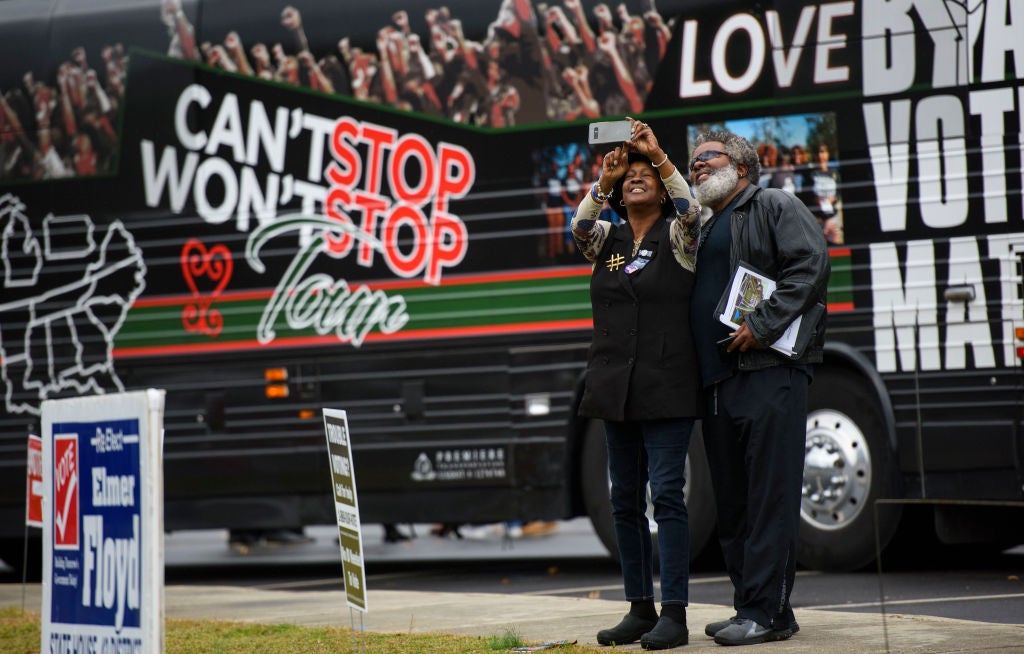
Election Week 2020 is slowly coming to a close, and battlegrounds states—specifically predominately Black cities and counties like Philadelphia, Detroit, and Atlanta—are poised to decide the fate of the country and the future of the American democracy project.
According to ABC exit polls, “Biden led by a 33-point margin among first-time voters, and a 26-point margin among voters ages 18 to 29.” This electoral reality is largely due to the protracted labor of Black women, who have been organizing to get Donald Trump out of office since before he was sworn in.
“I tell myself what I tell the people I’m meeting in Philadelphia, Chattanooga, Cleveland and any one who will listen,” LaTosha Brown, Black Voters Matter Co-Founder, wrote in ESSENCE. Brown is based in Georgia.
“This moment is not about Donald Trump or Joe Biden, or Hillary Clinton or even Barack Obama,” she wrote. “This is about us. This is about identifying and consolidating our power to change the system that was never built to include us.”
Alicia Garza, Senior Advisor to Care in Action—the policy and advocacy home for the over two million domestic workers and care workers across America—tells ESSENCE what to expect from Black women voters as election officials continue to count every ballot in the 2020 U.S. Presidential Election.
—
Black Women Lead
We know this much to be true: When women of color turn out, they win. That’s especially true for Black women, who are the backbone of the Democratic party. Black women only gained the right to vote in 1965, a full 45 years after the 19th Amendment—which granted white women the right to vote—was ratified.
Black women have the highest voting rate of any racial group, but they’ve often been ignored by campaigns and political organizations. Traditionally, Black voters and women of color voters, among others, are thought of by outdated political consultants as “infrequent” or “low-propensity” voters—but this is simply not true. Care in Action thinks of these voters as “high potential” voters—folks who have been deliberately kept out of political processes for centuries, but who have enormous potential to reshape the political terrain if we reach out to them directly.
Through our state programs, we’ve done just that—committed to focus on Black women, as well as all women of color, to turn out voters at an even higher rate. That’s our electoral mission, and it’s what we’ve seen work time and again.
Early numbers are showing that Black women, once again, turned out, but we still don’t have a full view. Every vote needs to be counted before a winner is declared, but here’s what we do know, based on polling from American Election Eve:
- Mirroring 2016, the Black women voter turnout for the Democratic ticket is +90%
- 52% of Black women polled said the most important issue in 2020 was the pandemic — which has disproportionately affected Black communities
- And 84% of Black women polled agree that voters in every state should have the choice to either vote by mail, vote early, or vote in person
Black women and domestic workers were ready to vote, through a pandemic and while being the caregivers for their families and America’s families. We are the key to progressive victories, and we can elect candidates who prioritize our communities—low-wage workers, women and people of color—in their policy decisions.
Record Turnout In Battleground States Is Due To Years Of Organizing
When a state swings, you know that’s a sign of decades of hard work by organizers, activists, movement and political leaders, working on the ground with voters to make sure their voices are being heard. And we see the results: states that were once Democratic pipe dreams—like Georgia—are now very much within reach because Black women and women of color are being engaged and mobilized.
Just look at Arizona: The race has been called for Senator-Elect Mark Kelly; Ana Tovar is the first Latina Democrat elected to the Corporation Commission; Julie Guiniggle is the first woman Democrat to be elected to County Attorney; Whitney Walker will be the first Black woman to be Supervisor and first to be elected countywide; and we hope to see the first Indian-American elected to Congress in Hiral Tipernini, who will be the first Asian-American from Arizona sent to Congress when she wins.
When I think about the power women of color have to make meaningful, generational change, I think of what Care in Action Director for North Carolina, Montica Talmadge said about the hard work we’re doing on the ground there:
“The 45th President cannot assume Southern states will cave to the fear-mongering and threats of intimidation that he trumpeted while campaigning across the State … The ‘Game Done Changed’ in The Old North State and Black women are ready to play.”
Change Is Happening Now
Care in Action endorsed 73 candidates—all women of color—for state and local office this year across our seven target states, and so far 46 of those candidates have won their races, with another 12 campaigns waiting on results. These are candidates aligned with our mission of centering domestic workers and people of color in policy, and 24 of the candidates we endorsed were running for the first time.
That’s what we call moving the needle. And we are one of many organizations doing the important work to make sure we elect down-ballot candidates who represent the interests of working families.
We are going to continue our strategy of organizing, centering and fighting to build power for Black women, because we see that it works.

Trump Won’t Go Quietly, But He Has To Go
Candidates for office can say what they like, but at the end of the day it’s the will of the voters that decides. We choose our leaders, our leaders do not choose their voters; that is the foundation of American democracy. Every voter’s voice must be heard and their vote counted, no matter how long it takes; it will be worth it when we emerge on the other side of this election, knowing that we gave every voter the respect and dignity of ensuring their vote counted.





